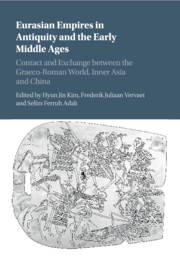 Eurasian Empires in Antiquity and the Early Middle Ages
Eurasian Empires in Antiquity and the Early Middle Ages Book contents
- Eurasian Empires in Antiquity and the Early Middle Ages
- Eurasian Empires in Antiquity and the Early Middle Ages
- Copyright page
- Dedication
- Contents
- Illustrations
- Maps
- Tables
- Contributors
- Acknowledgements
- Introduction
- Part I Political Organization and Interactions of Eurasian Empires
- Part II Socio-Institutional Aspects of Eurasian Empires
- Part III Cultural Legacies of Eurasian Empires
- 7 Homer and the Shi Jing as Imperial Texts
- 8 The Serpent from Persia: Manichaeism in Rome and China
- Part IV Archaeology of Eurasian Empires
- Conclusion
- Index
- References
7 - Homer and the Shi Jing as Imperial Texts
from Part III - Cultural Legacies of Eurasian Empires
Published online by Cambridge University Press: 12 October 2017
- Eurasian Empires in Antiquity and the Early Middle Ages
- Eurasian Empires in Antiquity and the Early Middle Ages
- Copyright page
- Dedication
- Contents
- Illustrations
- Maps
- Tables
- Contributors
- Acknowledgements
- Introduction
- Part I Political Organization and Interactions of Eurasian Empires
- Part II Socio-Institutional Aspects of Eurasian Empires
- Part III Cultural Legacies of Eurasian Empires
- 7 Homer and the Shi Jing as Imperial Texts
- 8 The Serpent from Persia: Manichaeism in Rome and China
- Part IV Archaeology of Eurasian Empires
- Conclusion
- Index
- References
- Type
- Chapter
- Information
- Eurasian Empires in Antiquity and the Early Middle AgesContact and Exchange between the Graeco-Roman World, Inner Asia and China, pp. 151 - 152Publisher: Cambridge University PressPrint publication year: 2017
References
- 1
- Cited by


